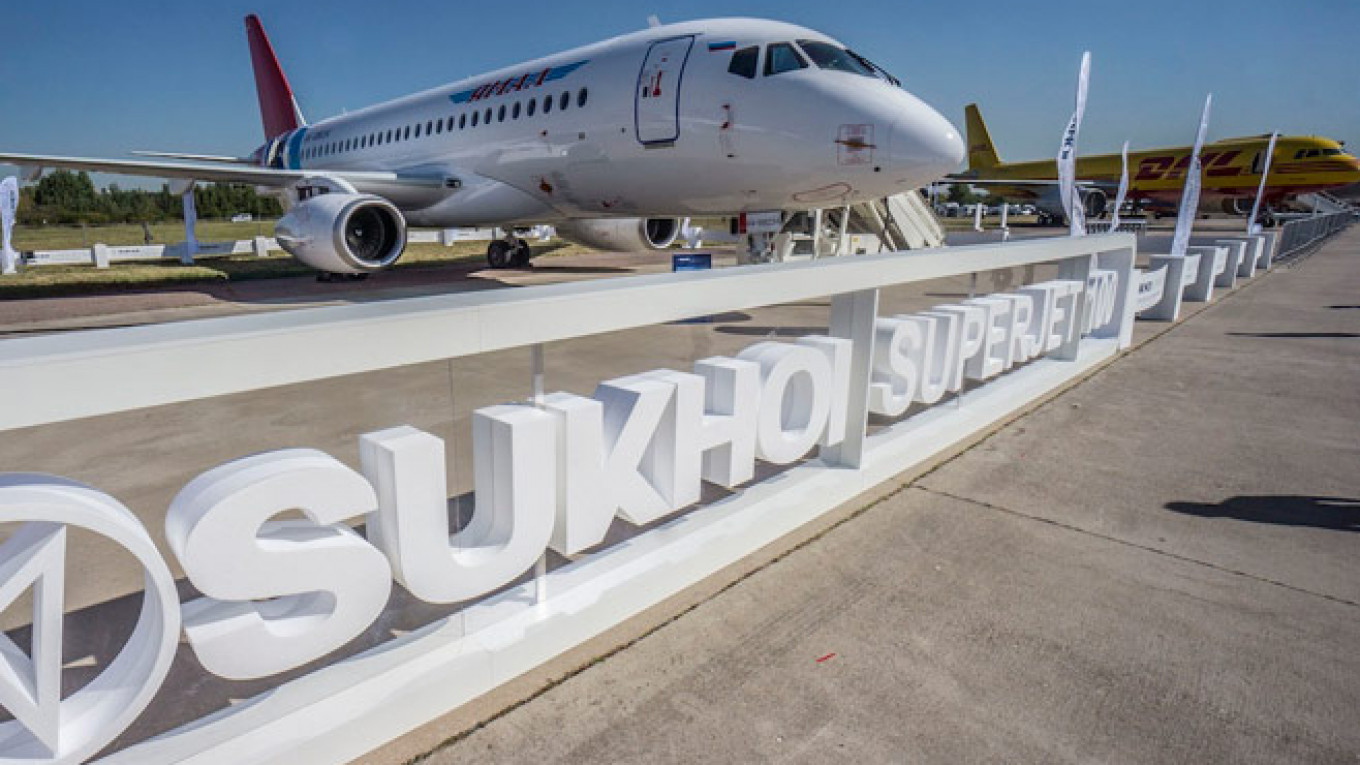Russian civil aviation companies face a disappointing week at the country's largest air show that opened on Tuesday as economic crisis and Western sanctions take a heavy toll on order books and scare away many foreign firms.
By contrast, demand for Russian military aircraft is booming and the biennial MAKS air show is increasingly being used to showcase the country's military might. According to Russian media, Russia and Iran will sign a $1 billion deal during the three-day show for S-300 missiles.
See the photo gallery: Old and New at MAKS
Two years ago — just before the Ukraine crisis plunged relations between Russia and the West to their worst level since the Cold War — the MAKS air show generated some $21 billion in deals, a figure civil aviation firms can only dream of today.
"The reasons why the number of deals is falling is very simple — the Russian aviation market is shrinking because of a steep ruble devaluation as people's purchasing power declines and they travel less abroad," said Andrei Rozhkov, infrastructure analyst from Metropol brokerage.
"Russian companies have not only stopped purchasing new planes, they are postponing delivery under old contracts."
A collapse in global oil prices has led to a steep ruble devaluation that has forced Russians to tighten their belts and cut down on non-essential spending, including foreign travel which has fallen by about 40 percent this year.
President Vladimir Putin shrugged off such concerns at Tuesday's opening ceremony, saying: "I'm convinced that, regardless of the current political environment, MAKS will serve — as before — as an efficient platform for experts' discussions, development of industrial cooperation and finding new partners."
However, state-owned United Aircraft Corporation (UAC), which has consolidated most Russian private aircraft builders over the past decade, is now subject to European Union sanctions — imposed over Moscow's role in the Ukraine crisis — and this means it can no longer raise long-term debt on global markets.
On Tuesday UAC signed a deal to supply 32 Sukhoi Superjet 100 aircraft for the Russian State Transport Leasing Company, effectively rubber-stamping a contract announced last year and financed with a Russian state loan. The deal's value has been previously estimated at $1.1 billion.
Aircraft builder Irkut, which is also part of UAC and is developing the short- and medium-range jet MC-21, could also sign a deal to deliver 20 planes to the leasing unit of state bank Sberbank, according to industry sources.
A spokeswoman for Irkut said contracts were possible but declined further comments.
Back in 2013, UAC signed deals to deliver as many as 96 Superjets and 82 MC-21 planes worth a total of $9 billion. Several Russian leasing companies also signed deals to buy as many as 100 Bombardier Q400 NextGen worth $3.4 billion.
Following Russia's annexation of Ukraine's Crimea region and the imposition of Western sanctions, however, hopes for large exports of Russian makes such as the Superjets have faded, with Moscow struggling to provide financing to prospective buyers.
The number of participants and exhibits will probably shrink this year, too. More than 1,000 companies attended MAKS 2013, which exhibited 287 foreign pieces of hardware from 44 countries, including 49 aircraft.
This year, Japanese Yokohama Rubber Company is the only official foreign sponsor of the show.
"Boeing, Airbus, Siemens — they are all participating again but of course in a rather reduced format," said one UAC source.
On Tuesday, Airbus was the only foreign company exhibiting its A350 model at the show, which was otherwise dominated by military equipment.
Putin said recently Russia is the world's second-biggest supplier of weapons after the United States, with a global market share of 27 percent and annual deals worth $14 billion.
As well as the Iranian deal — which follows the signing of a landmark deal last month between Tehran and world powers including Russia that aims to curb Iran's nuclear program — UAC may also agree this week to deliver 50 SU-35 fighters jets to the Russian Defense Ministry.
"In the past two years the Russian army has received around 300 military aircraft as part of rising state purchases," said Konstantin Makiyenko, deputy director of the Moscow-based Center for Strategies and Technologies Analysis.
But he added that state purchases would soon begin to decline because the fleet of aircraft had been well renovated and the state budget is now suffering from low oil prices.
A Message from The Moscow Times:
Dear readers,
We are facing unprecedented challenges. Russia's Prosecutor General's Office has designated The Moscow Times as an "undesirable" organization, criminalizing our work and putting our staff at risk of prosecution. This follows our earlier unjust labeling as a "foreign agent."
These actions are direct attempts to silence independent journalism in Russia. The authorities claim our work "discredits the decisions of the Russian leadership." We see things differently: we strive to provide accurate, unbiased reporting on Russia.
We, the journalists of The Moscow Times, refuse to be silenced. But to continue our work, we need your help.
Your support, no matter how small, makes a world of difference. If you can, please support us monthly starting from just $2. It's quick to set up, and every contribution makes a significant impact.
By supporting The Moscow Times, you're defending open, independent journalism in the face of repression. Thank you for standing with us.
Remind me later.






